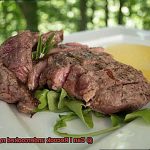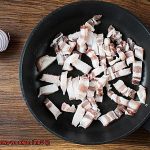Sick of hearing about brining every time you look up a new recipe? It’s like every food blogger and cookbook author is obsessed with it. But do you really need to do it? Can you skip the whole brining process without sacrificing flavor and texture?
As an expert in the culinary world, I’m here to give you the lowdown on this age-old technique. Brining is basically soaking meat or poultry in a mixture of salt, sugar, and water for several hours before cooking. The goal is to make your dish more flavorful, tender, and less likely to dry out during cooking. But while some swear by it, others say it’s just an extra step that’s not worth the hassle.
In this article, we’ll explore both sides of the debate so you can decide whether or not brining is right for you. We’ll dive into the science behind brining and talk about different types of brines. Plus, we’ll cover when to brine and when to skip it altogether.
By the end of this post, you’ll be armed with all the information you need to make an informed decision about whether or not to brine your next dish. So let’s get started – time to settle this once and for all.
Contents
What is Brining?

Brining is a culinary technique that can transform your meat from ordinary to extraordinary. By immersing your meat in a saltwater solution, you can imbue it with flavor, moisture, and tenderness that will tantalize your taste buds. But what exactly is brining, and when should you use it?
At its core, brining is all about infusing flavor and moisture into meat. The salt in the brine solution works by breaking down the proteins in the meat, making it more receptive to water and other delicious ingredients like herbs and spices. This leads to a succulent end product that’s bursting with flavor.
There are two main types of brining: wet brining and dry brining. Wet brining involves completely submerging the meat in the brine solution, while dry brining involves rubbing the meat with a mixture of salt and seasonings and letting it sit in the refrigerator for several hours.
So, when should you use brining? While it may not be necessary for every type of meat, it can be particularly beneficial for lean meats such as chicken breasts or pork chops that have a tendency to dry out quickly when cooked. Brining can also be an excellent option for larger cuts like turkeys or roasts, as it helps to keep the meat juicy during long cooking times.
However, there are some situations where you may not need to brine your meat. For example, if you are grilling a steak or cooking a fatty cut like brisket, you may not see as much benefit from brining since these meats are already tender and flavorful.
Ultimately, whether or not you choose to brine your meat will depend on your personal preferences and desired outcome for your dish. To help you decide, here are some benefits of brining:
- Enhanced Flavor: Brining adds depth and complexity to your meat’s flavor profile.
- Moisture Retention: Brined meat stays moist and juicy, even after cooking.
- Tender Texture: Brining helps to break down tough proteins in meat, resulting in a tender texture.
- Versatility: Brining works with a variety of meats, from chicken and pork to turkey and beef.

Benefits of Brining
If you’re looking to elevate your grilled meats to new heights, brining is the technique for you. By soaking meat in a saltwater solution before cooking, brining can work wonders for enhancing flavor, tenderness, and moisture.
Let’s start with tenderness. Tough cuts of meat like pork shoulder or beef brisket can be a challenge to grill without ending up with a chewy, dry end product. But fear not. Brining can break down the proteins in the meat, resulting in a more tender and juicy outcome. Whether you’re slow-cooking a brisket or grilling up some pulled pork, brining can ensure a mouthwatering final product.
But that’s not all – brining can also enhance the flavor of your meats. By soaking the meat in a saltwater solution, flavors can penetrate more deeply and infuse every bite with deliciousness. You can even experiment by adding herbs, spices, and sugar to your brine for an extra flavor boost.

Another benefit of brining is that it helps prevent your meats from drying out during cooking. We’ve all experienced the disappointment of a dry and tough piece of chicken or pork. But by pre-soaking your meat in a brine solution, you can maintain moisture and prevent dryness.

And if you’re short on time or cooking for a crowd, brining is still your friend. By soaking your meats in a saltwater solution beforehand, you can actually speed up the cooking process. This is especially helpful when you need to feed a large group of hungry guests.
Types of Meat Suitable for Brining
Brining meat is a culinary technique that can add an extra layer of flavor and moisture to your dishes. But not all types of meat are created equal, and some cuts are better suited for brining than others. Here are five types of meat that are most suitable for brining:
Poultry
Chicken and turkey are lean meats that can easily dry out when cooked. Brining helps to keep the meat moist and tender, resulting in a more flavorful bird. The salt solution in the brine also helps to break down the tough muscle fibers in the meat, which further enhances its texture.
Pork

Pork is another lean meat that benefits from a soak in a brine solution. Brining not only helps to keep the pork moist but also enhances its natural flavor. The salt in the brine can also help to balance out any excessive sweetness or saltiness in certain pork dishes.
Certain cuts of beef
While beef is not typically brined, some cuts like brisket or corned beef can benefit from a brine. These cuts tend to be tougher and require additional tenderizing before cooking. Brining can help to break down the muscle fibers, resulting in a more tender and flavorful beef dish.
Fish
Fish can also be brined, but it requires a delicate touch. Fish is more delicate than other types of meat, and over-brining can quickly turn it mushy. A milder brine and shorter brine time is recommended when brining fish.
Lean meats
Generally, meats that are leaner and have a tendency to dry out quickly are good candidates for brining. The salt solution in the brine helps to retain moisture and make the meat more tender. These meats include chicken breasts, pork chops, and certain cuts of beef.

Factors to Consider Before Skipping Brining
Before you make that decision, there are several factors to consider that could affect the outcome of your meal.
Firstly, consider the type of meat you are cooking. While chicken and pork can benefit greatly from brining due to their tendency to dry out quickly, beef and lamb may not require this step as their higher fat content naturally keeps them moist.
Secondly, the time available for preparation is crucial. Brining takes several hours or overnight to allow the meat to absorb the saltwater solution fully. If you’re short on time, you may need to skip brining and try other methods to keep your meat juicy and flavorful.
Next, the cooking method can also impact whether or not brining is necessary. Grilling at high temperatures can cause meat to dry out quickly, making brining a great option. However, if you’re using a low-temperature cooking method such as smoking, brining may not be necessary as the slow cooking process allows the meat to retain moisture naturally.
Lastly, personal preference plays a significant role in deciding whether or not to skip brining. While some people love the taste and texture of brined meat, others may find it too salty or overpowering. If you’ve tried brined meat before and didn’t enjoy it, then skipping brining may be the way forward for you.
Is It Necessary to Brine All Meats?
The answer, my friends, is not as simple as a yes or no. Brining is a process that involves soaking meat in a saltwater solution for several hours before cooking. This technique can enhance the flavor, tenderness, and juiciness of meat. However, it’s important to consider the specific cut of meat and personal preferences before deciding whether or not to brine.
Let’s start with naturally tender and juicy cuts of meat, such as filet mignon, ribeye steak, and pork tenderloin. These cuts don’t necessarily require the added moisture that brining provides. Adding brine to these cuts might even result in an overly salty taste or detract from their natural flavor.
On the other hand, tougher cuts of meat such as brisket, pork shoulder, and whole chicken can greatly benefit from brining. The saltwater solution breaks down the muscle fibers and allows the meat to absorb more moisture, resulting in a more tender and juicy final product.
Another factor to consider is the natural flavor of the meat. Some meats like lamb or game have a distinct flavor profile that may not mesh well with brine. In these cases, adding brine may actually detract from the natural taste of the meat.
Ultimately, whether or not to brine comes down to personal preference and the specific cut of meat being used. If you’re short on time or simply don’t want to go through the extra step of brining, there are other techniques such as marinating or using dry rubs that can also enhance the flavor and texture of your meat.
In summary, here are some key points to remember when deciding whether or not to brine:
- Brining can enhance the tenderness and juiciness of tougher cuts of meat.
- Naturally tender and juicy cuts may not need brine.
- The natural flavor of the meat should be considered before adding brine.
- Marinating or using dry rubs are alternative techniques to enhance flavor and texture.
- Ultimately, personal preference plays a significant role in whether or not to brine.
The Disadvantages of Not Brining Your Meat
If so, then you might want to think twice before skipping the brining step in your cooking process. Brining meat involves soaking it in a mixture of salt, water, and other seasonings, which provides numerous benefits such as added moisture, improved flavor, and even cooking. However, not brining your meat can lead to several disadvantages.
Firstly, by not brining your meat, it may end up dry and tough. The added moisture from the brine helps lean cuts of meat like chicken breasts or pork loin stay juicy and tender. Without it, the meat can easily become overcooked and lose its natural juices – a major disappointment for any meat lover.
Secondly, skipping the brining step means missing out on the opportunity to infuse your meat with a variety of herbs, spices, and other seasonings. These added flavors can take your dish to the next level and leave a lasting impression on your taste buds.
Lastly, not brining your meat can cause uneven cooking. If the meat is not evenly seasoned or doesn’t have enough moisture, it may cook at different rates in different areas. This can result in some parts being overcooked while others are undercooked – a food safety hazard that can also ruin the overall taste experience.
How Long Should You Brine Your Meat?
For poultry like chicken or turkey, the general rule of thumb is to brine for at least 4 hours and up to 24 hours. This allows the meat to soak up all the delicious flavors and moisture from the brine, resulting in a juicy and flavorful finished product that will leave your guests begging for seconds.
When it comes to pork, brining times vary depending on the cut of meat and desired outcome. A pork loin may only need 12-24 hours of brining, while a larger cut like a pork shoulder could benefit from up to 48 hours of brining. Don’t forget to adjust the time based on the type of pork you’re using.
Although beef can be brined, it’s less common than with poultry or pork. If you choose to brine beef, stick to a maximum of 24 hours to ensure tender and flavorful results.
It’s important to note that over-brining can be just as bad as under-brining. Avoid turning your meat into mush by following these general guidelines and adjusting based on your recipe and preferences.
In some cases, you may not even need to brine if you’re using a flavorful marinade or rub. And some cuts of meat are naturally juicy and tender enough that they don’t require brining at all.
Tips and Tricks for Perfectly Brined Meats
Here are five tips and tricks that will help you impress your guests with delicious meats.
Marinate your meats to add flavor and tenderize them. Mix acidic liquids like vinegar or citrus juices with herbs, spices, and other seasonings to create a mixture that will soak into the meat and make it succulent and juicy.
Season your meat well before cooking by rubbing it with a mixture of salt, pepper, herbs, and spices. This not only adds flavor but also draws out moisture from the meat, resulting in a crispier exterior when grilled or roasted.
Be mindful of the cooking time and temperature to prevent dry or undercooked meat. Use a meat thermometer to ensure that your meat is cooked to the appropriate internal temperature.
Consider using a dry brine instead of a wet brine. A dry brine involves rubbing salt and other seasonings onto the surface of the meat and letting it sit for several hours before cooking. This method is less messy than a wet brine but still adds flavor and moisture to the meat.
Let your meat rest before slicing into it. Allowing your meat to rest for a few minutes after cooking will help to redistribute the juices throughout the meat, resulting in a more succulent and flavorful end product.
Marinating your meats is a great way to add flavor and tenderness without brining. It’s easy to experiment with different combinations of herbs, spices, and acidic liquids to find a mixture that suits your taste preferences.
Seasoning your meat well before cooking is also crucial for achieving delicious meats without brining. Rubbing your meat with a mixture of salt, pepper, herbs, and spices ensures that the flavors are infused into every bite. It also helps to draw out moisture from the meat, which results in a crispy exterior when grilled or roasted.
It’s important to be mindful of the cooking time and temperature to prevent dry or undercooked meat. Using a meat thermometer will help you achieve the perfect internal temperature for your meat, resulting in a succulent and juicy end product.
Dry brining is another option to consider when trying to achieve perfectly seasoned and juicy meats without brining. Rubbing salt and other seasonings onto the surface of the meat and letting it sit for several hours before cooking will help to add flavor and moisture.
Finally, letting your meat rest before slicing into it is essential. Allowing the meat to rest for a few minutes after cooking will help to redistribute the juices throughout the meat, making it more succulent and flavorful.
Conclusion
To brine or not to brine? That is the question. The debate over whether brining is worth the effort and time is ongoing. Some swear by it for enhancing flavor, tenderness, and moisture retention, while others find it unnecessary.
However, lean meats like chicken breasts and pork chops that have a tendency to dry out quickly when cooked can benefit from brining. Larger cuts like turkeys or roasts that require longer cooking times can also benefit from this technique. But if you’re dealing with naturally tender and juicy cuts of meat, then brining may not be necessary as they already have enough moisture.
If you do decide to go down the brining route, it’s important to consider factors such as the type of meat being used, cooking method, and time available for preparation. Over-brining can result in an overly salty taste or mushy texture that no one wants.
But don’t fret if you’re not a fan of brining. Other techniques such as marinating or using dry rubs can also enhance the flavor and texture of your meat without the hassle of brining. Seasoning your meat well before cooking is crucial for achieving delicious meats without having to worry about soaking them in water beforehand.
In summary, while brining can be a great technique for enhancing flavor and tenderness in certain types of meat, it’s not always necessary for all cuts. Personal preference and experimentation with different methods will help you determine what works best for you and your dishes.






